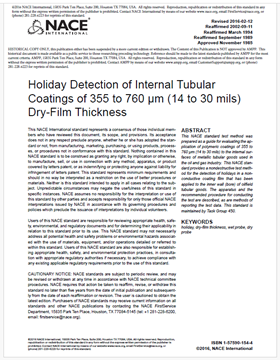Search
97553 FIELD TESTING OF VAPOR PHASE CORROSION INHIBITORS AND DEHUMIDIFICATION AS CORROSION CONTROL METHODS FOR ADVANCED DOUBLE HULL NAVAL SHIPS
Also Purchased
NACE TM0186-2016, Holiday Detection of Internal Tubular Coatings of 355 to 760 μm (14 to 30 mils) Dry-Film Thickness
Product Number:
21218-SG
Publication Date:
2016
$179.00
NACE TM0183-2018, Evaluation of Internal Plastic Coatings for Corrosion Control of Tubular Goods in an Aqueous Flowing Environment
Product Number:
21213-SG
Publication Date:
2018
$109.00
SP0108-2008, Corrosion Control of Offshore Structures by Protective Coatings
Product Number:
21126-SG
ISBN:
1-57590-218-4
Publication Date:
2008
$109.00
Recently viewed
-
 51316-7713-Pipeline Integrity Assessment In-Line Inspection and Direct Assessment Anomaly Density
51316-7713-Pipeline Integrity Assessment In-Line Inspection and Direct Assessment Anomaly Density
-
 98732 ANODE CONSUMPTION ON A SUBSEA X-MAS TREE
98732 ANODE CONSUMPTION ON A SUBSEA X-MAS TREE
-
 00661 ON-LINE DISSOLVED OXYGEN MONITORING IN BOILER FEEDWATER SYSTEMS
00661 ON-LINE DISSOLVED OXYGEN MONITORING IN BOILER FEEDWATER SYSTEMS
-
 04140 Use and Abuse of Artificial Acetate Buffering in Standardized and Application Specific Testing
04140 Use and Abuse of Artificial Acetate Buffering in Standardized and Application Specific Testing



